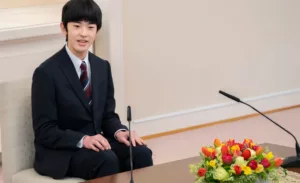Japan’s Prince Hisahito, the 18-year-old second in line to the Chrysanthemum Throne, recently held his first official news conference. The young royal shared his aspirations to balance his upcoming university studies with his royal responsibilities, while also pursuing his passion for dragonflies and environmental conservation.
A Historic Moment for Japan’s Imperial Family
The First Male Royal to Reach Adulthood in Decades
Prince Hisahito, who turned 18 in September 2023, is the first male member of Japan’s imperial family to reach adulthood in nearly 40 years. His father, Crown Prince Akishino, was the last male royal to achieve this milestone back in 1985. This event marks a significant moment for the imperial family, which has ruled Japan for over a millennium but now faces challenges like a rapidly aging population and declining birth rates.
A Symbolic Role in Modern Japan
During the news conference held at the Akasaka Estate in Tokyo, Prince Hisahito emphasized the importance of the emperor’s role as a symbolic figure who “always thinks of the people. He stated his intention to follow the examples of his uncle, Emperor Naruhito, and other senior members of the imperial family while remaining close to the people.
Prince Hisahito’s Academic and Personal Interests
Pursuing Biology and Dragonfly Research
Starting in April, Prince Hisahito will begin his studies at Tsukuba University near Tokyo, where he plans to focus on biology. His fascination with dragonflies, which began in childhood, will be a central theme in his academic research. He also expressed interest in studying ways to protect insect populations in urban environments.
A Love for Nature and Agriculture
Beyond his academic pursuits, the prince enjoys growing tomatoes and rice within the palace compound. This hands-on connection to nature reflects his broader interest in environmental conservation and sustainable practices.
Challenges and Traditions in Japan’s Imperial Succession
Male-Only Succession Laws
Japan’s 1947 Imperial House Law dictates that only male members can ascend to the throne. Female royals who marry commoners lose their royal status, further limiting the pool of potential successors. This has sparked debates about modernizing the succession laws to include women, especially as the imperial family continues to shrink.
Princess Aiko: A Popular Figure Without a Path to the Throne
Princess Aiko, the only child of Emperor Naruhito and Empress Masako, remains a beloved figure among the Japanese public. Despite her direct lineage, current laws prevent her from becoming empress. The conservative government is exploring ways to allow female royals to retain their status after marrying commoners, though male-only succession remains the priority.
A Glimpse into the Imperial Family’s Academic Pursuits
A Tradition of Studying Biology and the Arts
Members of Japan’s imperial family often pursue studies in biology, literature, and the arts, as they are required to remain apolitical. Emperor Naruhito specializes in water transport, while his father, Emperor Emeritus Akihito, is known for his research on fish. Crown Prince Akishino, Prince Hisahito’s father, is an expert in chickens.
A Coming-of-Age Ceremony
On September 6, 2024, Prince Hisahito will celebrate his 19th birthday with a traditional coming-of-age ceremony at the palace. This event will further solidify his role as a key figure in Japan’s imperial future.
Key Takeaways
- Prince Hisahito is the first male royal to reach adulthood in nearly 40 years.
- He plans to study biology at Tsukuba University, focusing on dragonflies and insect conservation.
- Japan’s imperial succession laws remain male-only, sparking debates about modernization.
- Princess Aiko, though popular, is barred from ascending the throne under current laws.
- The imperial family has a tradition of studying biology and the arts to remain apolitical.
By blending tradition with modern interests, Prince Hisahito represents a new generation of Japan’s imperial family, poised to navigate the challenges of the 21st century while honoring centuries-old customs.
Source cnn.com
















